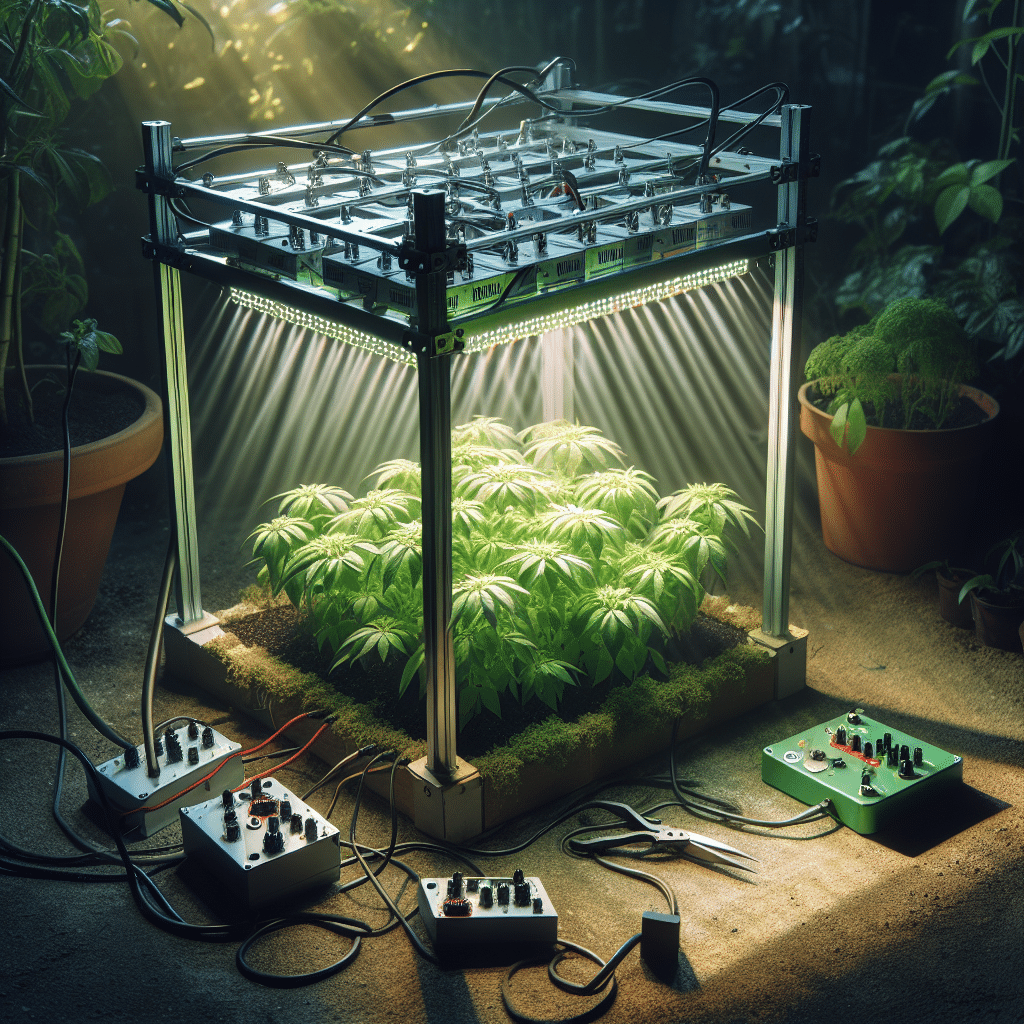In the ever-evolving world of DIY projects, the latest undertaking is a smart, efficient, and most importantly, self-made LED grow light build. Expertly demonstrated in a video by Greengenes Garden, the focus is on creating a 330-watt square-shaped LED grow light, perfect for illuminating 3×3 plots. The step-by-step guide showcases the use of eight matching heat sinks and eight LED light boards, pre-assembled and securely held together with thermal tape.
Forging ahead in his innovative way, Greengenes Garden also simplifies the frame creation process by using basic angled aluminum from Home Depot in place of the traditionally used 80/20, which some deem too expensive or difficult to acquire. The construction involves screws and T nuts to affix the frame onto the heat sink, ensuring a sturdy and reliable build. This resourceful guide is not only ideal for passionate gardeners, but anyone eager to plunge into the vibrant realm of DIY. Such creations also become an exciting rollercoaster ride, where satisfaction is found in the process just as much as the final outcome.
Greengenes Garden’s Guide to a Quick DIY LED Grow Light Build
Sometimes we’re thrown into scenarios we hadn’t planned for. Recently, we found ourselves needing a grow light. Rather than opting for a store-bought option, we explored the idea of a quick DIY LED grow light. It turned out to be a creative and rewarding endeavor.
Building a 330-watt Square-shaped LED Grow Light
In understanding our situation, we assessed our needs and resources. We decided to build a 330-watt square-shaped LED grow light, perfect for 3×3 plots. Equipped with eight heat sinks and eight LED light boards, the project was totally doable. And we must say, the final product was genuinely satisfying.
Materials and Tools Needed
Tools are the marrow of any DIY project. For this task, our toolkit comprised preassembled LED light boards, heat sinks, basic angled aluminum from Home Depot, screws, and T nuts. We managed to gather everything we needed with relative ease and little dent in our wallets.

This image is property of i.ytimg.com.
Assembling the LED Light Boards and Heat Sinks
Now onto the exciting part: assembling the bits and pieces. Through numerous projects, we’ve learned that assembly is like a puzzle you must carefully put together. We already had the LED boards and heat sinks preassembled and thermally taped together. With those ready, assembly was a breeze. It was like we were building the skeleton of our light.
Creating the Frame
The frame of the LED light is like the backbone. Using basic angled aluminum from Home Depot — a more cost-effective and accessible option than 80/20 — we crafted the frame. Regardless of the initial doubts about the chosen material, we were pleasantly surprised at how well it served its purpose.

This image is property of images.pexels.com.
Attaching the Frame to the Heat Sinks
Screws and T nuts played heroes in attaching the frame onto the heat sinks. We often find the devil lies in the details; attaching the frame to the heat sinks was one such detail, easily overlooked, but intensely critical. It was fascinating to see the frame shape up and to start to see glimpses of the final LED light.
Ensuring Proper Thermal Paste Application
Smooth and proper thermal paste application is one of the crucial factors to the success of this DIY project. We made sure that any remaining air bubbles between the strip and thermal paste were pressed out, a trick that always pays off in improving the overall efficiency of light performance.

This image is property of images.pexels.com.
Securing the LED Light Boards to the Frame
After assembling the heat sinks and boards, they were attached to the aluminum frame to create the light. Securing the LED boards to the frame made the final product robust and dependable. An HLG 320 1400 power supply would ultimately power this composite structure in our future plans.
Powering the Grow Light Fixture
Building the grow light fixture is only half the battle; powering it is the other half. Our plan to use an HLG 320 1400 power supply lays out the framework for powering the grow light fixture. The beauty of DIY is the power to customize according to our needs and resources continuously. So depending on what’s available at the time, we can adjust accordingly.

This image is property of images.pexels.com.
Considerations for Purchasing Photobooth Strips
Do you want to recreate this DIY project? Haste makes waste. The photobooth strips we used tend to sell out quickly, but ones just like them should become available again soon. Make sure to buy them as soon as they hit the market so you can gather all the necessary supplies for your DIY.
Availability of Heat Sinks
What’s intriguing about DIY projects is resource availability. Sometimes, some materials aren’t readily available, like the heat sinks we used. However, that shouldn’t discourage you. DIY is all about improvisation and flexibility. Alternate materials, like heatsink USA profiles, can serve a similar purpose, granting the same end result.
In summation, our unplanned scenario became an unplanned build and an unplanned video. It showed us that when life gives you a few heat sinks, and LED lightboards, build a grow light! No matter what, we learned that with a little creativity, you recreate beautiful things from unexpected encounters.
In our Greengenes Garden’s Guide to a Quick DIY LED Grow Light Build, we will be utilizing the following materials:
Boards, which can be purchased from Pacific Light Concepts here.
Heatsinks, available from Pacific Light Concepts here and Heatsink USA here.
Thermal Interface Material (TIM), which could be obtained from Amazon here.
LED Drivers, can be sourced from Octopart here.
Potentiometer, we recommend this one from RapidLED here.
Frame, which you can purchase from TNutz here.
T-nuts and screws, available at Amazon here.
Power cords, you could buy from Amazon here.
Three-pin connectors, that can be purchased from Amazon here.
Wire that can be sourced from Amazon here.
A gland box, available from Amazon here.
Lastly, for eyebolts, we suggest heading to your nearest Home Depot.


